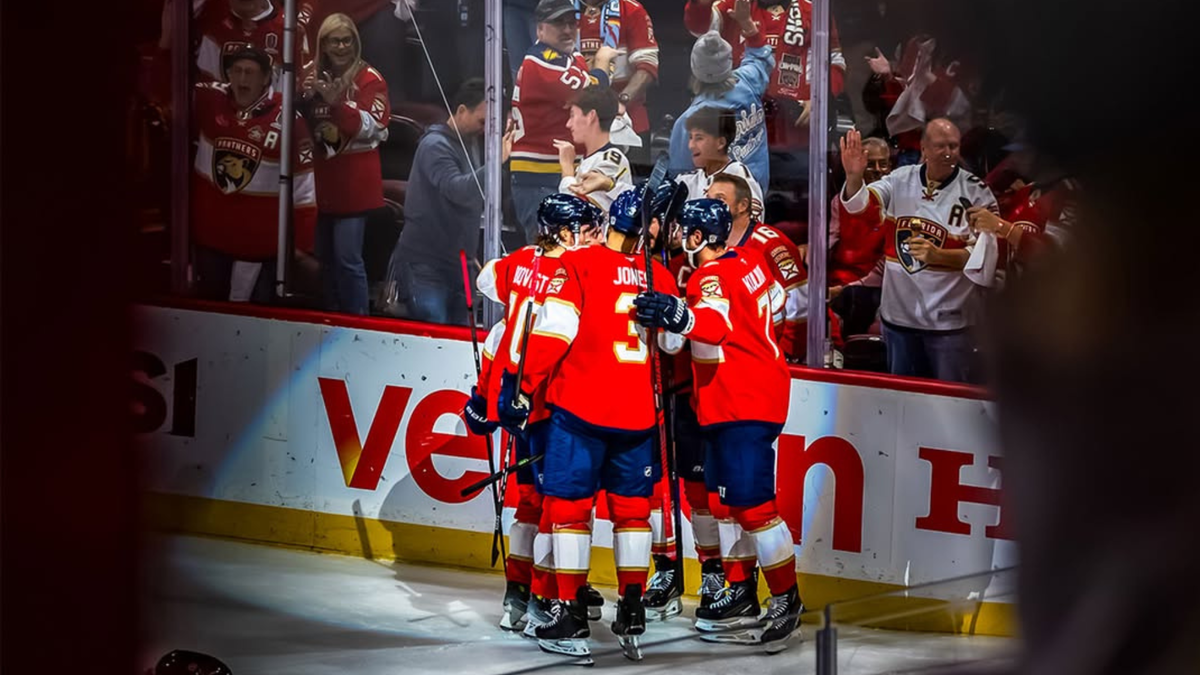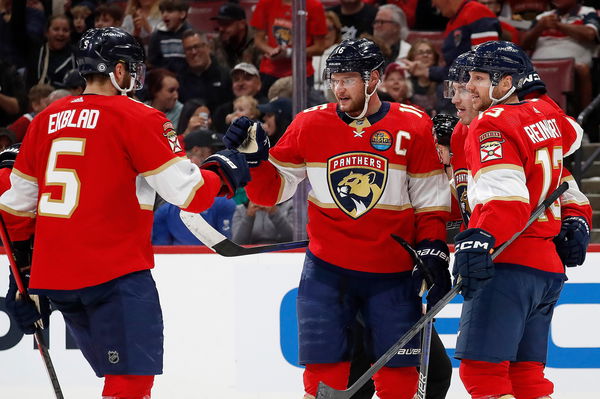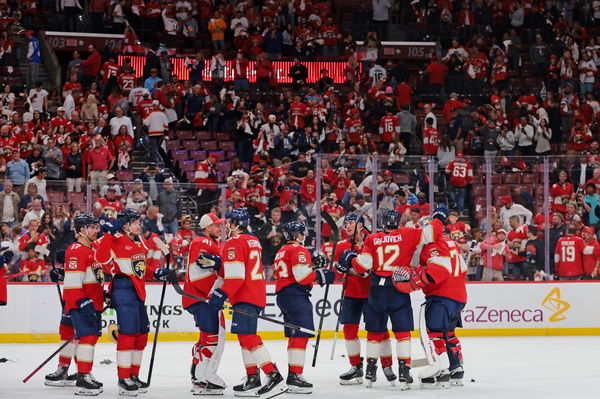
Imago
Credits: Instagram / @flapanthers

Imago
Credits: Instagram / @flapanthers
In the high-stakes chaos of the Stanley Cup Final, no moment is too small to tilt the balance. Through Games 1 and 2 between the Florida Panthers and Edmonton Oilers, that tilt has come not just from goals or saves—but from something more subtle: officiating. Game 1 allowed certain infractions to slide, but by Game 2, the referees cracked down, almost as if someone had hit reset on what was permissible. For teams trying to game the system, that shift proved costly.
Watch What’s Trending Now!
Take Florida’s Sam Bennett. In Game 1, he got tangled up with an Oiler and fell into goaltender Stuart Skinner—a collision that didn’t result in a penalty and even allowed a goal to stand. But by Game 2, a near-identical scenario ended differently. Bennett, again reacting to contact, toppled into Skinner. This time, the referees didn’t let it pass. The penalty called on him sparked debate, especially since it mirrored what went unpunished in the previous game. Elliotte Friedman was on the Sportsnet podcast 32 Thoughts on June 7, and he didn’t hold back while unpacking the officiating shift between Games 1 and 2.
ADVERTISEMENT
“It was interesting, the refereeing and the officiating from Game 1 to Game 2,” he began, highlighting the contradiction in how Bennett’s collisions with Skinner were judged across the two nights. “Game 1, Bennett gets knocked onto the goalie and the goal counts. Game 2, Bennett sees that contact—falls on, or feels that contact, falls on Skinner—and gets a penalty.” The contrast wasn’t just tactical—it was mental. What had been allowed was now penalized, mid-series, in front of the same two benches.
Bennett himself expressed confusion in a mid-game interview with Renaud Lavoie of TVA, saying he was “surprised to get that penalty.” Friedman sympathized. “Now I understand why he would be surprised to get that penalty, ’cause he didn’t get it in Game 1.” The context here matters. In both instances, Bennett was operating at high speed near the crease, reacting instinctively to incoming contact. For officials to reverse their stance without warning put players like him in a difficult spot. “You know me, I’ve been consistent—you’ve got to protect the goalies,” Friedman added, reiterating a larger point about goalie safety. But even he acknowledged that what was being protected had suddenly changed shape.
ADVERTISEMENT
The most telling shift came not just in the calls made, but in how Bennett adapted. “There were some other situations later in that game where Bennett was very, very careful about where he was in relation to Skinner.” That wasn’t just a subtle change—it was a visible adjustment. At least twice during Game 2’s second period, Bennett pulled up just outside the crease instead of charging in, wary of being penalized again. For someone known for pushing the edge, that was notable. “I think it’s really interesting that they clearly dialed that back,” Friedman noted. “You almost wonder now if Edmonton had challenged that kind of a goal in Game 2—would it have gone the other way?” Friedman then zoomed out to something broader—Florida’s pattern of exploiting gray areas.
ADVERTISEMENT

Imago
Image via Facebook/Florida Panthers
“Florida was brilliant at manipulating timeouts and icings to get more rest,” he said. This wasn’t about rough play or fluky goals. It was about small, deliberate delays Florida had used throughout the playoffs, having tired players fake equipment issues or attempt line changes after icings. In Game 2, the referees clamped down. “Mikkola tried it once—he went to the bench on an icing—and Chris Rooney was right there and pulled him off the bench. He’s like, ‘Not tonight. That’s not happening on my watch. Get right back out there right now.” It was a blunt moment, but one that symbolized the new tone: tricks wouldn’t fly anymore.
Even then, not everything got caught. Late in Game 2’s overtime, Edmonton forward Viktor Arvidsson was visibly livid when Aaron Ekblad took a slapshot, dropped to the ice injured, and the Panthers still managed to get a rush going. “I thought Arvidsson was really angry when Ekblad got hurt by the shot and Edmonton got a chance,” Friedman said. “Arvidsson was furious—he felt it was too many men. That’s the one Florida got away with in this game.” The irony? Earlier in the night, the Panthers had been buried under penalties—so many, in fact, that someone from a team Florida had eliminated earlier in the playoffs texted Friedman: “Oh, now they’re calling penalties against the Panthers.” Florida’s bench likely felt the same whiplash. “I’m sure the Panthers were sitting there saying, ‘What is going on tonight?’” Friedman added.
ADVERTISEMENT
Still, the calls weren’t uniformly harsh. In overtime, one egregious miss stood out: a blatant too-many-men infraction that never got whistled. “The one I thought they got away with—or anybody really got away with—was… that was a pretty obvious too many men,” Friedman said. “And that’s one, like puck over glass, that you could make pretty easily—but they didn’t call it. And that’s the way it goes.”
It all pointed to something bigger. After weeks of teams getting away with borderline infractions, especially the Panthers, Game 2 marked a rare reset: the NHL wasn’t just calling penalties. It was sending a message.
ADVERTISEMENT
However, the officiating wasn’t the only thing under Elliotte Friedman’s radar. He also turned his lens to the players themselves—pulling no punches when it came to evaluating who’s actually stepping up under pressure, and who’s merely blending into the background.
ADVERTISEMENT
Friedman calls out stars still searching for their moment
As the stakes rise, so do expectations from the stars, and not everyone is answering the bell. Take Aleksander Barkov. The Panthers’ captain hasn’t had the kind of explosive start expected of him, and that wasn’t lost on Friedman. “If you’re the Florida Panthers and you’re going home and you’re saying, ‘We’re tied at 1-1 and Barkov has kind of had the start he’s had,’ (a) you’re feeling really good about being tied, and (b) you’re feeling really good because he’s too skilled, too talented, too determined,” he said. It was both a compliment and a challenge, because for all Barkov’s tools, the scoreboard and the series haven’t yet felt his full impact.
Goaltending, too, has mirrored that uneven pattern. Friedman didn’t mince words: “It’s not going to last like this. Both goalies have had their moments—Bobrovsky and Skinner made some unbelievable saves in this one. Skinner also had some incredible luck, but that’s part of the game. Sometimes it goes your way. But neither goalie has really put their stamp on the series yet.” And the stats back him up.

Imago
NHL, Eishockey Herren, USA Stanley Cup Playoffs-Carolina Hurricanes at Florida Panthers. May 24, 2025, Sunrise, Florida, USA. The Florida Panthers celebrate the win against the Carolina Hurricanes in game three of the Eastern Conference. Final of the 2025 Stanley Cup Playoffs at Amerant Bank Arena. Sunrise Amerant Bank Arena, Florida. USA, EDITORIAL USE ONLY PUBLICATIONxINxGERxSUIxAUTxONLY. Copyright: xSamxNavarrox 20250524_tdc_na2_050
And the stats back him up. In Game 1, Skinner kept Edmonton afloat with 29 saves on 32 shots, closing with a .906 save percentage. In Game 2, though, the Panthers came at him with waves of pressure—he faced 42 shots and stopped 37, dipping to a .881 save rate. Some of those saves were spectacular, yes. Others were pure survival. Bobrovsky, on the other end, hasn’t yet produced the kind of playoff-defining performance he’s capable of, leaving the goaltending duel in a holding pattern.
ADVERTISEMENT
With referees clamping down and tactical tricks running dry, it’s no longer about who can game the margins. That’s the tension heading into Game 3: the feeling that the Final is still waiting for someone– anyone, to seize it.
ADVERTISEMENT
ADVERTISEMENT
ADVERTISEMENT